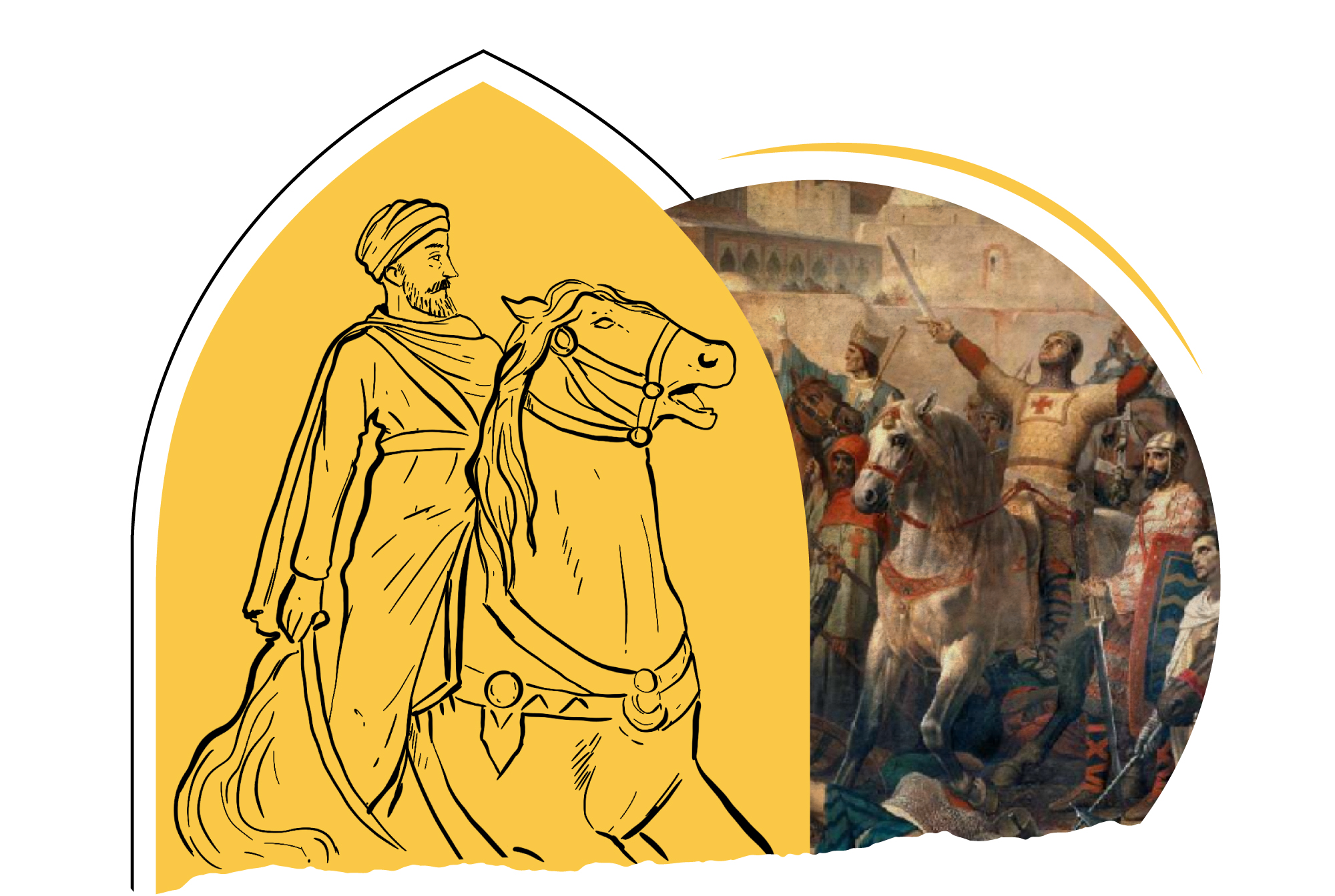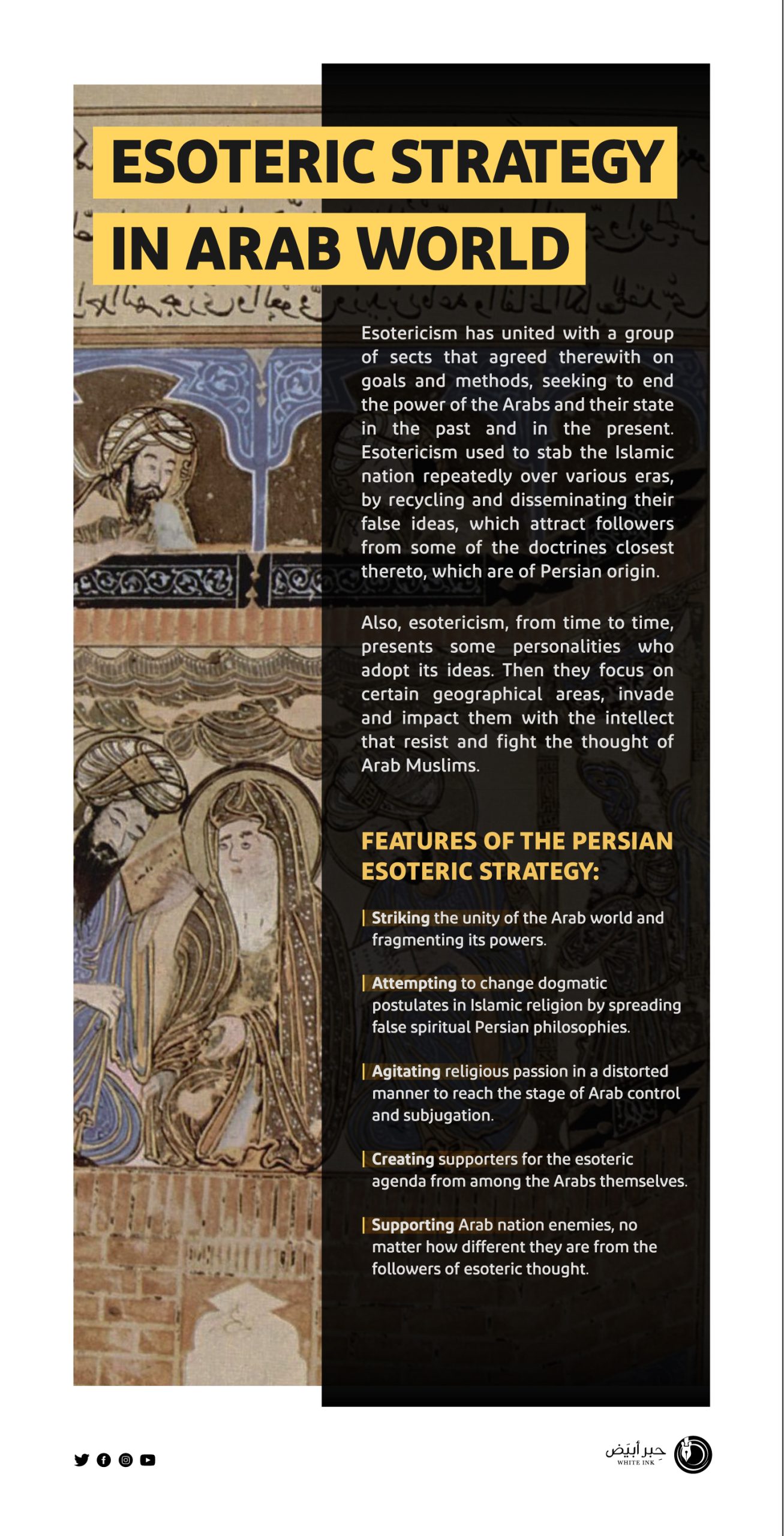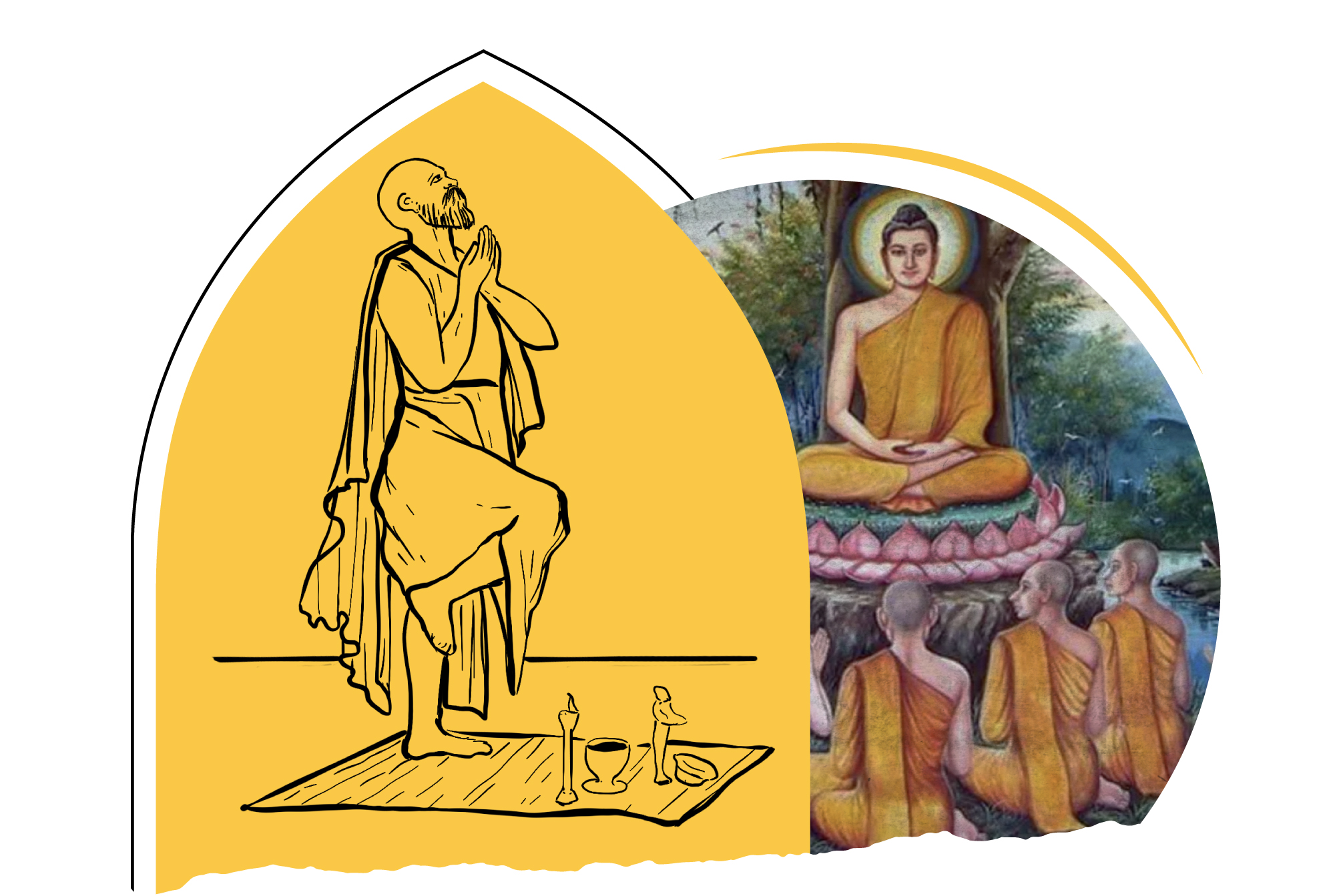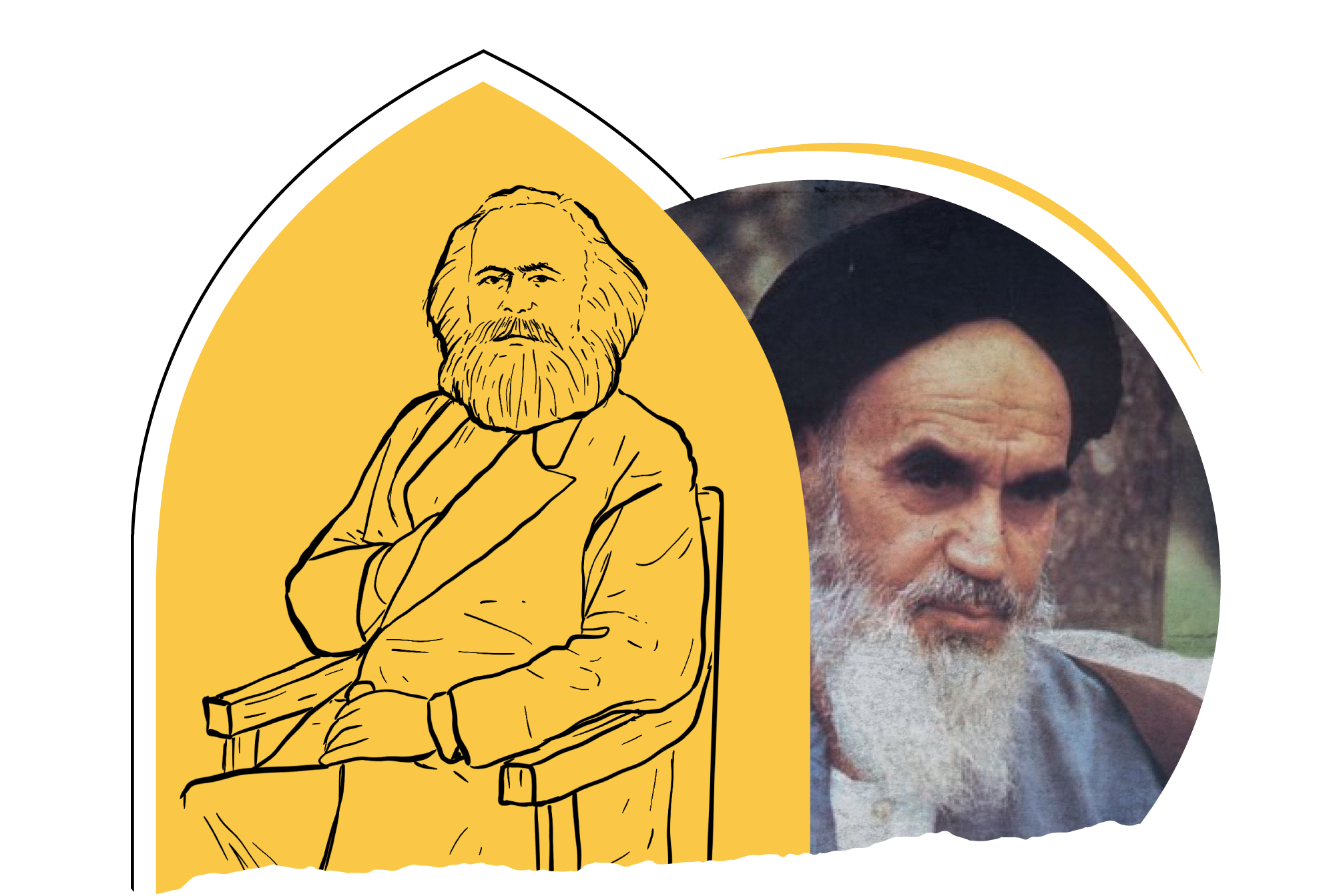
Esotericism is the Foundation of Terrorist Secret Organization in the History of Islamic State
Researchers have paid much attention to studying the negative impact of the esoteric sects on Islamic jurisprudence and thought. However, they have not been interested in dealing with the political repercussions of these esoteric sects that deviated from Islamic nation consensus “Ijma’a”. It is established that these sects have produced a lot of heresy in the field of jurisprudence by calling for the mysterious concept of Islam, which is the “esoteric” concept. Those sects rejected the interpretations of the texts unanimously agreed-upon by the scholars of the nation and argued that what those scholars have done was nothing but adopted the “apparent” meaning of texts and that we have to deal therewith by adopting the esoteric concept. This opened the door wide for several heresies in the field of texts interpretation.
Negative impacts of esoteric sects in political history created a rift in the unity of the Islamic world and fragmented it throughout its entire body. Esoteric hatred of the Arab Islamic state prompted it to befriend and support Arab Muslims’ enemies.
To start with, esoteric sects disguised behind the call to support the Prophet’s family and their right to rule. They forgot that the Abbasid call, at its inception, has raised the slogan of Prophet’s family governance, while the Persians are the party from which most of the esoteric sects emerged thereafter. They supported the Abbasid call and when the Abbasids succeeded and their state was established, the Persians thought that it was their opportunity to restore their old power. However, Abbasid caliphs rejected the new Persian power centers and the caliphs re-established the Arab Islamic state’s prestige. At that point, the Persian esoteric sects increased their activities to weaken the Arab states.
History records several examples of the esoteric sects’ political dimension, in terms of their desire to restore Persian rule and destroy the Arab state, or, at least, weaken it to control the ruling from within. In the aftermath of the elimination of Abu Muslim al-Khorasani at the hands of Caliph al-Mansur, so that ruing the nation would be in the hands of a single man, some revolted in Khorasan region against the Abbasid state, led by a person e called “Sinbad”. Some sources describe “Sinbad” as a Magian, yet he claimed to be a Muslim. Hussein Mujib al-Masri believes that “what was attributed to Sinbad, that he was a Magian, is a weak possibility. Perhaps he adopted a half-Persian doctrine, which is not an Islamic doctrine in the prevailing opinion”. Thus, Al-Masri defines the identity of Sinbad as an esoteric figure; one of those sects that tried to mix Islam with the ancient Persian Magian teachings. The story of Sinbad ends with eliminating him and his sedition at the hands of Caliph Al-Mansur.
History tells us about Bani Buwaihi, who are from the Persians who, in fact, controlled the reins of government in Baghdad by military force. They manipulated the Abbasid caliphs by isolation and assignment favor their own interests and racist purposes. There is no doubt that this matter contributed, to a large extent, to weakening the Abbasid state, until it reached a stage of weakness that allowed the Tatars to storm Baghdad and destroy one of the most important strongholds of Islamic civilization.
Esoteric sects went beyond working to weaken the Abbasid state and threaten the unity of the Islamic world and resorted to allying with the enemies of the nation. Perhaps Bābak Khorramdin movement was the worst example of this, as the latter revolted against the Abbasids and joined the esotericists in an attempt to overthrow the state. Even worse, Bābak Khorramdin communicated with the Byzantine state, which is the foremost enemy of the Abbasid state. Khorramdin aimed to form an alliance with the Khurramites in the Persian regions and the Byzantine state in Asia Minor, in order to pounce on the Abbasid state in Baghdad and eliminate it. Although all his endeavors failed at the end, yet such movements weakened the power of the Abbasids to a large extent.
The other crueler and more terrifying in the history of esoteric movements was the “Assassins” sect. Bernard Lewis, who is one of the key figures who studied that sect, said: “By the thirteenth century, the word “Assassin” was within the European usage in various forms, all in this sense of “hired killer”.
Assassins’ history is full of tragedies as they spread terror and panic. However, what concerns us here is their role in destroying the unity of Islamic world by revolting against the Abbasid state that united the nation at that time. In addition, they cooperated with the enemies. This is evident in the nature of the shameful and disgraceful role the Assassins undertaken during the Crusades; they did not work in the interest of the Islamic ranks that were facing the waves of the Crusades, but rather they worked for their own benefit. There is no evidence to thar more than the Assassins’ alliance with the Knights Templar, which is a secret terrorist Crusader squad that shed the blood of many Muslims during those wars.
Some well-established researchers have realized the awful role undertaken by the esoteric movements in the political history of the Islamic world. Among the most prominent of them is Hussein Mujib al-Masri, who specializes in Persian studies. He is of the opinion that “From among the Persian people of heresy, there are some who revolted, declared their disobedience and set up war against the Arabs. It is by their faith that they undoubtedly wanted to revive their Persian nationalism and revive their power that was in the distant past”. On the other hand, Muhammad Abdullah Annan (one of the key historians of Islamic history) believes that esoteric movements are nothing but “secret societies established to destroy Islam”. Thus, we have a full and clear picture of the negative political role of the Persian esoteric movements on the unity of Islamic world.
Esotericism worked on activating its political role from as early as in the call phase of the Abbasid state.



- Bernard Lewis, The Assassins, arabized by Mohammad Al-Azab Musa, 2nd edition (Cairo: Madbouly Bookshop, 2006).
- Hussein Mujeeb Al-Masry, Links between Arabs, Persians and Turks (Cairo: Al-Dar Al-Thaqafa, 2001).
- Mohammad al-Khatib, Esoteric Movements in Islamic World (Amman: n.p, 1986).
- Mohammad Al-Khasht, Assassin Movement (Cairo: Ibn Sina Library, 1988).
- Mohammad Abdullah Annan, History of Secret Societies and Destructive Movements in the East (Cairo: Al-Mukhtar Foundation, 1991).


Throughout History Esotericism has Relatively Changed the Reality of Arab and Islamic History
It is evident to whoever delves into the history of esoteric movements that afflicted the Muslims that such movements, since their inception, have struggled to overthrow the Islamic state and to return the glories of their Magian ancestors by spreading their esoteric concepts. Here, the religious and political dangers are inseparable, as their religion and creed cannot be established without their power and state. Esoteric movements are hidden, disguised propaganda more than the overt resistance it appears to be. This is how it is different from other sects. It is surrounded by an atmosphere of secrets and full of methods of deceit and deception. The emergence of the esoteric seduction yielded in successive revolutions and turmoil that caused widespread chaos, while establishing their own small scattered nations. Thus, Muslims were faced with vices of which they knew no origin. People started to doubt each other and permissiveness invaded the minds of young people like the plague. No bachelor was trusted in his village, even in his father’s house. Distrust broke the bonds of social and religious unity.
Esotericists represented the most essential reasons that led to the deterioration of the nation, as they relied on distorted Zoroastrian Magi beliefs, as well as other doctrines, creeds and sects that were deteriorating the body of Muslims. Mongols, Tartars and Crusaders’ wars weakened and fragmented the Islamic nation, rendering it a fertile field for esotericists. They became active in their call and took advantage of opportunities to spread their destructive principles. Abu Hamid al-Ghazali explained to us the esotericism and their principles and objectives in a precise statement in his article: “As unanimously agreed by all articles, this call was not initiated by an affiliate of any religion or creed, supported by a prophethood. It is led by a desire to slip away from religion. A group of Magi, Mazdakists, atheistic dualists and a large group of ancient atheist philosophers consulted and agreed to devise a measure that would mitigate the damage they sustained consequent to Muslims seizing and relieve them of the anguish that befell them thereby. They silenced their tongues from uttering what they genuinely believed; their denying the prophets, the Day of Judgement and Resurrection and returning to Allah at the end of all matters. They claimed that all prophets are fake and bogus, who enslave people by the arts of sorcery…” In this context, Al-Ghazali continues: “Then they, the esorists, said that our method is to choose a man who helps us with the doctrine, then we claim that he is from the Prophet’s family and that all people must pledge allegiance and be obedient thereto. He is the caliph of the Prophet, infallible and commits no mistakes by the grace of Allah Almighty. However, we do not spread that claim in the close proximity to the caliph we elected in the capital, as proximity to the house may tear these curtains, while with lone distance, the respondent to the call has less chance to check it and figure out the truth thereof. Their purpose behind all of that is to attain authority and power in order to seize Muslims’ wealth and women and avenge them for the harm, damage and affliction they believe Muslims have caused them”.
Imam Al-Ghazali pointed out the corruption of esoteric beliefs and their methods of spreading their secret call, moving away from the center of the state for fear of raising suspicions around them. Secrecy was their religion and method of revealing what they conceal. Looking at those deviant esoteric sects, we will find that they meet in common grounds among themselves, as follows:
First: Destroying the Islamic faith from within, from its foundations, and adopting beliefs that rely on materialistic philosophies that are disguised by the teachings of atheist or conspirator Persian imams. This is in addition to adopting Kharijites’ theological propositions and thoughts. Among those sects, there are those impacted by the Brahmin of India, the eastern philosophers, the Buddhists and the remnants of the Chaldeans and Persians. They believed in the transmigration of souls and resurrection and claimed the divinity of Ali bin Abi Talib and others.
Second: Those sects introduced a religion and jurisprudence that has nothing to do with Islam for which Prophet Muhammad (PBUH) was sent to call, as their objective was to destroy Islam and nullify its pillars one by one; Hajj, zakat, fasting and praying, replacing them with strange acts of worship that differ from what Islamic sharia instructs.
Third: Most of the esoteric sects participated in stirring up strife, conspiring, murdering and violating, in addition to their permissibility of women until they became cheap commodities for those sects.
Fourth: Those sects stood, in general, with every invader or warrior of the Islamic states by providing services and betrayals against them. Evidence is countless in our Islamic history over the past centuries. The main source from which these esoteric sects derived their beliefs was contrary to the principles and foundations on which Islam was built. There is no doubt that these teams were driven by malicious hands towards vice goals and objectives, the foremost of which was distorting the image of Islam in the hearts of its people, as a prelude to undermine it and return to their delusions and falsehoods destroyed by Islam.
Those who are familiar with the history of esoteric sects do link the ancient historical events with the modern realities, so that what we see today of their actions is not surprising. Their ancient political history is stained by darkness and extreme hatred towards Islam and Muslims. Their modern history is an extension of that history. The colonizer found in those esoteric sects a key and close ally against the Arab and Islamic states until they became an obedient tool in the hands of the enemies in our contemporary world. Perhaps the publication of esoteric doctrines in the early periods of the twentieth century is evidence to that hidden alliance, including their publication of four esoteric books abstracted from manuscripts in one of the monasteries, in “AMROSIANA” library, Milan, Italy, and published by the Scientific Institute.
Both ancient and modern esotericism movements agreed on the war against the Arab states.



- Suhail Zakkar, Al-Jami fi Akhbar Al-Qaramita (Damascus: Dar Hassan, 1987).
- Manea Al-Juhani, Easy Encyclopedia of Doctrines and Religions, 4th Edition (Riyadh: Dar Al-Nadwa Al-Alamiyah for Printing, Publishing and Distribution, 2000).
- Mohammad al-Khatib, Esoteric Movements in Islamic World (Amman: n.p, 1986).
- Mohammad Abdullah Anan, History of Secret Societies and Destructive Movements in the East (Cairo: Al-Mukhtar Foundation, 1991).

Esotericism and Khomeinism
Rotten Trunk of a Malignant Tree
Prior to elaborating on the dialectical relationship between Khomeinism and Esotericism, it is essential to note that the latter is not a political organization or an established institutional structure, but rather a system of ideas in which millions believe. Its survival and spread were due to being embraced by the Persian state, which considered it a means and tool to annihilate Islam from within, especially after the Persians were certain that the results of any direct confrontation with the Muslim Arabs are predetermined.
In this context, esotericism continued with the persistence of the Persian state. The political goals of both parties intersected in eliminating Arab Islam and empowering the Persian race, which is the sublime political goal that can only be achieved through legitimizing the system of interpretation of the religious text in a way that serves the Persian agendas in the region.
Khomeinists benefited from esoteric thought and adopted its strategy of exporting thoughts and ideas, in preparation to entering those areas. Following the esoteric approach as adopted by those who were falsely called the Fatimids, Khomeinists sought to penetrate Arab societies and keep up with their customs and traditions, good or bad. They did not stop there, but sought religious interpretations with a view to legitimize a group of abnormal practices.
Stemming from that strategic identification between both branches of the same tree, the new esotericists followed the approach of Ismaili Fatimids, who used to send “skillful trained preachers, who avoid confrontation and provocation of the target communities, take advantage of people’s innate love for the Prophet’s family. They also established scientific centers and worked on qualifying preachers for the esoteric doctrine. Very quietly they isolated Sunni scientific and judicial authorities and replaced them with esoteric ones”.
Esoteric interpretation and work to adapt Qur’anic text has produced extremist and terrorist organizations, no matter how they falsely try attribute themselves to Sunnis or Shiites alike. Islam is clear and easy to memorize and understand. It is, therefore, an argument against everyone, with no need for any detailed elaboration of its meanings, except in the areas of linguistic and scientific miracles. This is why the Holy Quran keeps pace with the development of times and the reality of man.
Khomeinism was impacted by esotericism approach and by philosophical schools, utilizing their principles to achieve political goals. Khomeini was also influenced by Marxist thought regarding dealing with the masses and leading them by adopting their slogans, even if they were wrong. The writings of Marx and Engels unanimously agree on the need to keep pace with the masses, even if they are heading towards destruction, on the basis of dimensional clarification and re-framing according to the original approach of Marxist theory pertaining to the necessity of having a vanguard party or a “revolutionary vanguard.
Khomeinist school is nothing more than an extension of esoteric thought through its attempts to monopolize the interpretation of religious text, restricting that privilege to the jurist holy person. This is how that “political” doctrine has professionalized religion for its objectives. It is established that, by tracing the impacts of Khomeinism; i.e., that they followed the esoteric approach and their method in luring followers. They are still a supporter of every invader who attacks Muslims, from the Tatars to the Crusaders and to the British who were supported by the head of esotericism in in India, the Aga Khan. They are now in Syria and Lebanon, crawling with their activity towards countries Arab and Islamic regions, in which the activities of the Sunni preachers are fading, with the encouragement of the Khomeinist state”.
It can be asserted that the danger of the new esotericists lies in their sectarian penetration and exploitation favor their ethnic goals, as well as for their existential war against everything related to Islam. The wickedness of the “new esoteric conquest” has reached the level of “cooperation” with the colonialists, carrying various slogans, the most prominent of which is the esoteric slogan, with the aim of conspiracy.
The alliance of the mullahs’ regime with the United States of America to invade Iraq is no different from the collusion of Minister Ibn Al-Alqami with the Tatars against the Abbasid state. Both parties contributed to the fall of Baghdad and the spread of savagery and chaos in the historical capital of the Abbasid state.
The late King of Morocco, Hassan II, had previously warned of the danger of Khomeini’s thought. Morocco declared him apostate with a legal fatwa in view of the distortions that Khomeini brought, including that the imam has a level of sanctity that renders him in a position higher than a selected king or a prophet. Perhaps that position is key in view of its strong symbolism, given that the ruling family in Morocco ends its lineage to the honorable Prophet’s family. However, they disavowed the mullahs’ regime that exploits the slogan of loyalty to the Prophet’s family to implement a malicious agenda that primarily aims at eliminating Islam and establishing the race.
Esotericism intersected with Persian racism and both endeavored to destroy the Arabs and Muslims nation

In entirety, it can be said that “Islam and all its sects that entered Persia… were distorted and altered, because the purpose was not to adopt this or that doctrine, … Rather, the intention was to exploit it and raise as a slogan against the Islamic state and its correct creed”.


- Manea Al-Juhani, Easy Encyclopedia of Doctrines and Religions, 4th Edition (Riyadh: Al-Nadwa Al-Alamiyah Printing, Publishing and Distribution House, 2000).
- Martin Vanessa, Creating an Islamic State: Khomeini and the Making of a New Iran, Journal of King Faisal Center for Studies and Research, p. 3, 4 (2010).
- Muhammad al-Khatib, Esoteric Movements in Islamic World (Amman: Dr. N, 1986).
- Mohammad Abdullah Anan, History of Secret Societies and Destructive Movements in the East (Cairo: Al-Mukhtar Foundation, 1991).





